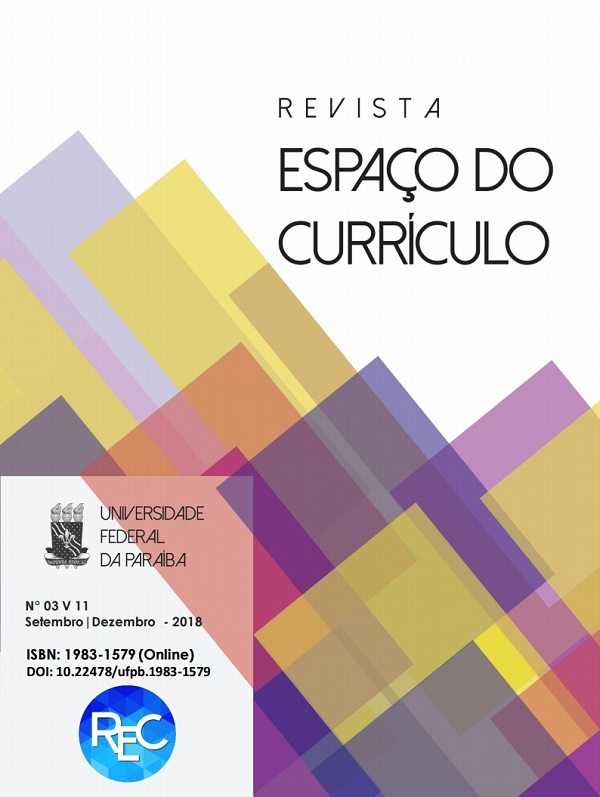EDUCATION, ANIMAL AND ENVIRONMENTAL ETHICS
removing the anthropocentric paradigm
DOI:
https://doi.org/10.22478/ufpb.1983-1579.2018v3n11.40557Keywords:
Education, Speciesism, EmpathyAbstract
This article intends to defend the urgency of promoting a broad revision of the anthropocentric bias that has marked the programmatic contents of the different disciplines offered in Brazilian schools, in most diverse segments. In this sense, it bets on a reflection on the ethical basis on how non-human animals are being presented in formal educational spaces. We believe that the consolidation of the environmental debate surrounding issues such as garbage, pollution, health and conservation of species reiterates anthropocentrism and contributes to the unfeasibility of animals and environmental issues. It is, therefore, to lead the debate to a new paradigm, namely: the search for a form of non-specific education. For this, we intend, firstly, to present convergent basic concepts of animal and environmental ethics, so that we can identify the question regarding the relational value present in the environmental debate. From a different perspective on the place of animals and the environment, we intend to defend a pedagogical proposal that assumes the role of questioning the various forms of injustices committed against animals and the environment and, at the same time, presenting the notion of capacity imaginative, capable of stimulating individuals to reflect on the human-environment-human-animal relationship more empathically, through the mobilization of visual resources such as films and photographs.
Downloads
Metrics
References
ADAMS, Carol, GRUEN, Lori. (ed.) Ecofeminism: Feminist Intersections with Other Animals and the Earth. Bloomsbury Academic, 2014
DIAS, Maria Clara. (org.) A Perspectiva dos funcionamentos: por uma abordagem moral mais inclusiva. Rio de Janeiro: Editora Pirilampo, 2015.
___. Ensaios sobre a Moralidade. Rio de Janeiro: Editora Pirilampo, 2016.
___. Sobre Nós: expandindo as fronteiras da moralidade. Rio de Janeiro: Editora Pirilampo, 2016b.
DIAS, Maria Clara; OLIVEIRA, Fabio Alves Gomes. (org.) Ética Animal: Um Novo Tempo. Rio de Janeiro: Editora Livros Ilimitados, 2018.
GILLIGAN, Carol. A Different Voice: Psychological Theory and Women’s Development. Cambridge M.A: Harvard University Press, 1982
.
HORTA, Oscar. El antropocentrismo y el argumento de los vínculos emocionales, em Dilemata, n. 1, 2009, pp 1-13.
PLUMWOOD, Val. Feminism and the Mastery of Nature. London-NY, Routledge, 1993.
PULEO, Alicia. Libertad, igualdad, sostenibilidad. Por un ecofeminismo ilustrado. Isegoría. Revista de Filosofía Moral y Política, 38, 2008: 39-59.
___. Ecofeminismo para otro mundo posible. Madrid, Cátedra, 2011.
KANT, Immanuel. Grundlegung zur Metaphysik der Sitten. Werke, Frankfurt am Main: Suhrkamp, 1968.
REGAN, Tom. Animal Rights and Environmental Ethics. In: BERGANDI, Donato. The structural links between ecology, evolution, and ethics: the virtuous epistemic circle. Bioscience, Oxford University Press (OUP), 2014, 64 (3). pp.117-126.
REGAN, Tom. The Case for Animal Rights. In: SINGER, Peter (ed.). Defense of Animals. Blackwell, 1985.
SINGER, P. Libertação Animal. Trad. MarlyWinckler, ed Lugano, Porto Alegre, São Paulo, 2004.
___. Practical Ethics, Cambridge: Cambridge University Press e Williams, 1993.
WARREN, Karen. Ecofeminist Philosophy. A Western Perspective on What it is and Why it Matters. Oxford, Rowman and Littlefield, 2000.
MOORE, Adrian William (eds.) The Human Prejudice in Bernard Williams, Philosophy as a Humanistic Discipline, Princeton: Princeton University Press, 2006.
Downloads
Published
How to Cite
Issue
Section
License
By submitting an article to Curriculum Space Journal (CSJ) and having it approved, the authors agree to assign, without remuneration, the following rights to Curriculum Space Journal: first publication rights and permission for CSJ to redistribute this article. article and its metadata to the indexing and reference services that its editors deem appropriate.
















